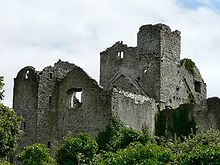Boverton
History

Boverton was founded during the reign of William the Conqueror in England. It is thought that he himself founded Boverton as a farming community beneath his mighty castle. However, Robert Fitzhamon is credited with founding the castle here, Boverton Place, during the 12th century. The castle was rebuilt around 1587 by Roger Seys, a land owner and attorney general of Wales. Boverton Place was an "impressive" fortified manor house of considerable size.
The Seys family, prominent in Glamorgan throughout the 17th century, moved out in the late 17th century and it fell into decay in the following century. Local legend states the castle is haunted by the Black Lady who was spotted by men working on the castle in the early 19th Century. She was described as a tall, shadowy figure dressed in mourning clothes.
Landmarks
In present-day Boverton there is a brook, several housing estates, a fish and chip shop, post office, hair salon, gentlemen's barbers, veterinary surgery and The Boverton Castle pub.
Notable people
- Theophilus Redwood (1806–1892), pharmacist, after whom the Redwood Building in Cardiff University was named
Gallery
-
Boverton Castle pub
-
Church Meadow Estate
-
The Causeway
-
Tremains Farm
-
Boverton Bridge
-
Boverton Court
-
Boverton old road
-
Boverton Place blue plaque
References
- ^ Spurgeon, Clifford (April 2000). An inventory of the ancient monuments in Glamorgan. Royal Commission on Ancient and Historical Monuments in Wales, H.M.S.O. p. 516. ISBN 978-1-871184-22-8. Retrieved 19 April 2012.
- ^ Glamorganshire. CUP Archive. p. 174. GGKEY:B09ZLPUCGCQ. Retrieved 19 April 2012.
- ^ The History of the Great Sessions in Wales, 1542-1830: Together with the Lives of the Welsh Judges, and Annotated Lists of the Chamberlains and Chancellors, Attorneys General, and Prothonotaries of the Four Circuits of Chester and Wales; the Lord Presidents of Wales, and the Attorneys General and Solicitors General of the Marches. Priv. Print. for the author by E. Davies, Great Britain. Public Record Office. 1899. p. 100. Retrieved 19 April 2012.
- ^ Trevelyan, Marie (1 January 1973). Folk-Lore and Folk-Stories of Wales. Kessinger Publishing. p. 203. ISBN 978-0-85409-938-2. Retrieved 19 April 2012.








